Audi Q7 VS Toyota Prius
Audi Q7
The Audi Q7 combines luxurious comfort with impressive versatility, making it a standout choice in the SUV market. Its sophisticated design and meticulous attention to detail create an elegant yet robust presence on the road. With advanced technology and a focus on safety, the Q7 ensures a premium driving experience for both the driver and passengers.
more informationToyota Prius
The Toyota Prius stands as a pioneer in the realm of hybrid vehicles, offering an eco-friendly driving alternative with its innovative technology. Its aerodynamic design and comfortable interior make it a practical choice for those looking to reduce their carbon footprint without sacrificing style. Additionally, the Prius boasts a reputation for reliability and efficiency, contributing to its lasting popularity among environmentally conscious drivers.
more information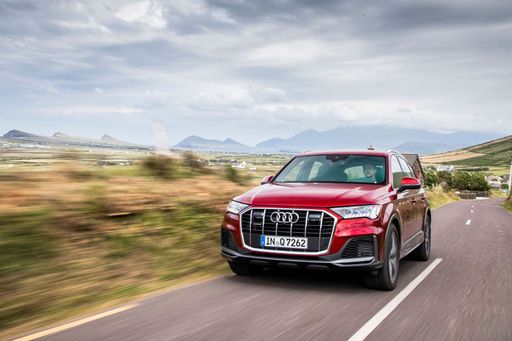 @ audi-mediacenter.com
@ audi-mediacenter.com
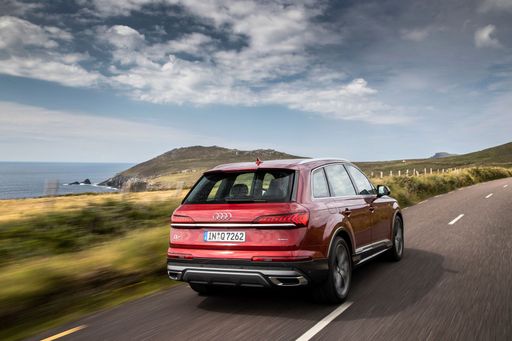 @ audi-mediacenter.com
@ audi-mediacenter.com
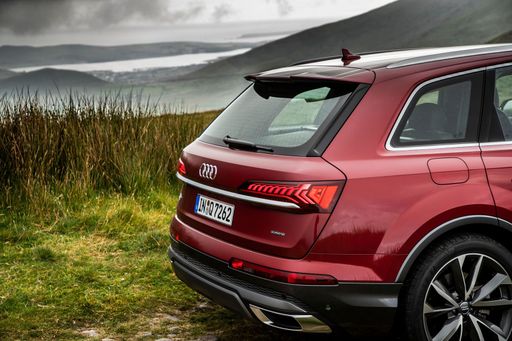 @ audi-mediacenter.com
@ audi-mediacenter.com
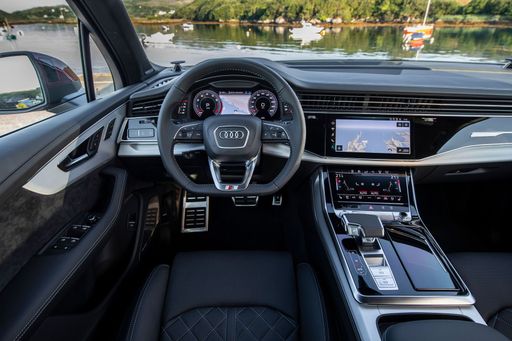 @ audi-mediacenter.com
@ audi-mediacenter.com
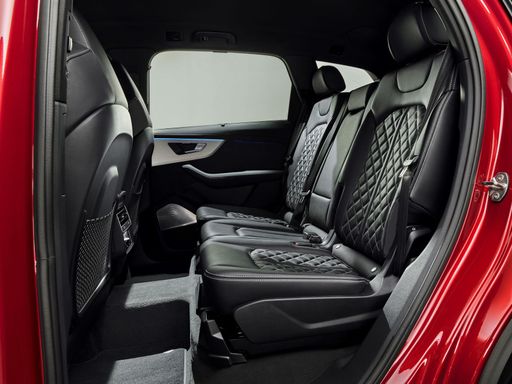 @ audi-mediacenter.com
@ audi-mediacenter.com
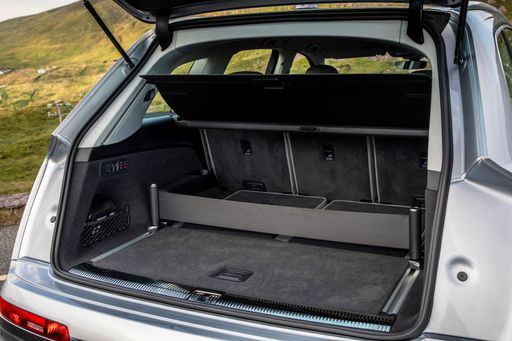 @ audi-mediacenter.com
@ audi-mediacenter.com
 @ Toyota
@ Toyota
 @ Toyota
@ Toyota
 @ Toyota
@ Toyota
 @ Toyota
@ Toyota
Costs and Consumption |
|
|---|---|
|
Price
about 68000 - 97300
£
|
Price
about 39400 - 45800
£
|
|
Consumption L/100km
1.2 - 12
L
|
Consumption L/100km
0.5 - 0.7
L
|
|
Consumption kWh/100km
-
|
Consumption kWh/100km
-
|
|
Electric Range
83 - 84
km
|
Electric Range
72 - 86
km
|
|
Battery Capacity
22
kWh
|
Battery Capacity
-
|
|
co2
28 - 272
g/km
|
co2
12 - 17
g/km
|
|
Fuel tank capacity
75 - 85
L
|
Fuel tank capacity
40
L
|
Dimensions and Body |
|
|
Body Type
SUV
|
Body Type
Hatchback
|
|
Seats
5 - 7
|
Seats
5
|
|
Doors
5
|
Doors
5
|
|
Curb weight
2055 - 2460
kg
|
Curb weight
1620 - 1630
kg
|
|
Trunk capacity
563 - 887
L
|
Trunk capacity
284
L
|
|
Length
5072
mm
|
Length
4599
mm
|
|
Width
1970
mm
|
Width
1782
mm
|
|
Height
1703 - 1735
mm
|
Height
1470
mm
|
|
Payload
640 - 885
kg
|
Payload
365 - 375
kg
|
Engine and Performance |
|
|
Engine Type
Diesel MHEV, Plugin Hybrid, Petrol MHEV, Petrol
|
Engine Type
Plugin Hybrid
|
|
Transmission
Automatic
|
Transmission
Automatic
|
|
Transmission Detail
Automatic Gearbox
|
Transmission Detail
CVT
|
|
Drive Type
All-Wheel Drive
|
Drive Type
Front-Wheel Drive
|
|
Power HP
231 - 507
HP
|
Power HP
223
HP
|
|
Acceleration 0-100km/h
4.1 - 7.1
s
|
Acceleration 0-100km/h
6.8
s
|
|
Max Speed
226 - 250
km/h
|
Max Speed
177
km/h
|
|
Torque
500 - 770
Nm
|
Torque
-
|
|
Number of Cylinders
6 - 8
|
Number of Cylinders
4
|
|
Power kW
170 - 373
kW
|
Power kW
164
kW
|
|
Engine capacity
2967 - 3996
cm3
|
Engine capacity
1998
cm3
|
|
Top speed
226 - 250
km/h
|
Top speed
177
km/h
|
General |
|
|
Model Year
2024
|
Model Year
2023
|
|
CO2 Efficiency Class
G, B
|
CO2 Efficiency Class
B
|
|
Brand
Audi
|
Brand
Toyota
|
Audi Q7
Audi Q7: A Benchmark in Automotive Excellence
The Audi Q7 continues to hold its ground as a versatile and luxurious SUV, offering a rich blend of cutting-edge technology, impressive performance, and comfort. With its recent facelift, the Q7 introduces innovative elements that cater to modern-day driving demands. Explore the technical details and unique attributes that make the Audi Q7 a class leader.
Engine Options and Performance
The Audi Q7 is available with a range of engine options designed to suit various needs and preferences. These include Diesel Mild-Hybrid, Plug-in Hybrid, and Petrol Mild-Hybrid configurations. The power output for these engines ranges from 231 to an exhilarating 507 PS, catering to both efficiency seekers and performance enthusiasts. The Audi Q7 can accelerate from 0 to 100 km/h in as little as 4.1 seconds, showcasing its athletic performance.
Innovative Technology Integration
The Audi Q7 integrates the latest technological advancements to enhance the driving experience. The intuitive Audi Virtual Cockpit and a comprehensive infotainment system ensure that the driver remains informed and entertained. The vehicle’s mild-hybrid systems significantly improve fuel efficiency and reduce emissions, highlighting Audi’s commitment to sustainability without sacrificing performance.
Advanced Safety and Driver Assistance
The Q7 is equipped with state-of-the-art safety features and driver assistance systems to ensure peace of mind on the road. Audi Pre Sense, adaptive cruise control, lane-keeping assist, and a 360-degree camera system work seamlessly together to help prevent accidents and enhance the driving experience.
Design and Interior Comfort
With its bold, sophisticated design, the Audi Q7 is both robust and stylish. The SUV offers configurations for five to seven seats, making it adaptable for families and groups. Meticulously crafted materials, adjustable seating, and advanced climate control systems provide a comfortable environment, even on long journeys.
Environmental Efficiency
The Audi Q7’s environmentally conscious engineering includes models with CO2 emissions as low as 28 g/km. For those opting for the Plug-in Hybrid variant, an impressive electric range of up to 84 km ensures emission-free mobility for daily commutes, reinforcing Audi's commitment to a sustainable future.
Conclusion
The Audi Q7 embodies a sophisticated blend of power, technology, and luxury, making it a standout in its class. Whether you’re looking for a spacious family vehicle, a tech-savvy companion, or a robust performance SUV, the Q7 delivers at every front, proving why it remains a popular choice for discerning drivers.
Toyota Prius
The All-New Toyota Prius: Revolutionising Efficiency and Performance
The Toyota Prius, a name synonymous with hybrid innovation, has once again shown why it remains at the forefront of eco-friendly automotive technology. The latest models have enhanced technical features and innovations, setting new standards for efficiency and driving experience.
Hybrid Performance: A Leap Forward
The latest Prius models employ a sophisticated 2.0 litre Plug-in Hybrid system that flawlessly melds petrol and electric power. With a power output of 223 PS, it propels the Prius with impressive dynamism, reaching 0-100 km/h in just 6.8 seconds. This performance-oriented aspect of the Prius does not compromise on efficiency, with an astonishing fuel consumption ranging from 0.5 to 0.7 L/100km.
Electric Range and Efficiency
One of the key highlights of the new Prius is its substantial electric-only range. Depending on the variant, it can travel between 72 to 86 km on electric power alone, making it an ideal choice for urban commutes where zero emissions are preferred. The hybrid system's CO2 emissions are remarkably low, between 12 and 17 g/km, contributing to its CO2 Efficiency Class B rating.
Engineering Excellence with CVT
The Prius is equipped with a state-of-the-art Continuously Variable Transmission (CVT), ensuring a smooth and efficient drive. This advanced transmission supports the front-wheel-drive layout, delivering power seamlessly and enhancing driving pleasure without sacrificing fuel economy.
Stylish Design and Comfort
Designed as a sleek five-door hatchback, the Prius offers a comfortable and spacious interior with seating for five passengers. It measures 4599 mm in length, 1782 mm in width, and 1470 mm in height, offering a practical balance of size and comfort. The boot space, while tailored for the hybrid battery, still provides a decent 284 litres of storage.
Cost Efficiency
The running costs of the Prius are competitive, with monthly expenses estimated between €1064 and €1188, and cost per kilometre ranging from 42.6 to 47.5 cents. Its efficient design results in a maximum speed of 177 km/h and a practical fuel tank size of 40 litres, ensuring less frequent stops on longer journeys.
Conclusion: The Prius Legacy Continues
The Toyota Prius continues to lead by example in the realm of hybrid technology. Combining impressive power with unmatched efficiency and a sophisticated driving experience, it is clear that the Prius remains a compelling choice for the environmentally conscious driver. Its innovative features and favourable cost metrics only bolster its appeal in the modern automotive landscape.
